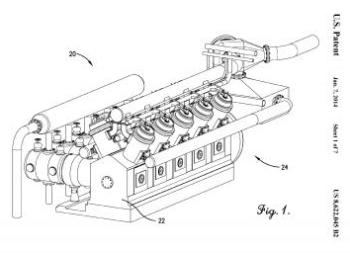Feb 14 2014
A patent was recently issued to Kansas State University for a system that controls the airflow to pistons in reciprocating internal combustion engines -- engines powered by pistons.
 This is a figure of the air control system from the patent paperwork.Credit: Kansas State University
This is a figure of the air control system from the patent paperwork.Credit: Kansas State University
The system enables large-bore, multi-cylinder engines used in trains, pipelines, backup diesel generators and other fields to run efficiently while producing lower levels of harmful emissions than they do currently.
The patent, "Active Air Control," was issued to the Kansas State University Research Foundation, a nonprofit corporation responsible for managing technology transfer activities at the university. The patent is for research by former faculty member Kirby Chapman and doctoral graduate Diana Grauer.
The Kansas State University-developed system uses an airflow sensor to measure and control the airflow rate into each piston in real time. Algorithms adjust the airflow accordingly and equalize the rate in multiple cylinders at the same time. This reduces the levels of nitrogen oxides produced during combustion in the engine.
The air control system offers a low-cost method to control and lower the production of nitrogen oxides and helps legacy engines meet compliance with EPA 2011 regulations. The system also was designed to fit various engine systems.